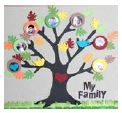Parents are encouraged time and time again to read stories from books with their young children, as the benefits are many – improved literacy skills, increased school success, parent-child bonding, developing a lifetime interest in reading and more. Yet, everyday family stories may offer some of the same benefits as reading, along with other benefits, too.

Benefits of Family Storytelling
Storytelling is the most powerful way that individuals share (and record) their life experiences. Storytelling in a family can include stories about a parent’s childhood, a family trip, or a child retelling about the day’s activities. When adults share more family stories with children, children benefit.
-
Social and emotional benefits
- A study about family storytelling found that “Family stories provide a sense of identity through time, and help children understand who they are in the world." i Researchers found that when parents share family stories, children tended to view their family as stronger, their self-esteem was higher, they showed lower levels of anxiety or nervousness, they had fewer behavior problems and they were better able to deal with the effects of stress.ii,iii Studies show that when parents use more details and emotions when talking about past everyday events, called elaborative reminiscing, with their preschool-aged children, the children told more detailed and coherent narratives one to two years later. These children also demonstrated a better understanding of other people’s thoughts and emotions.iv Family reminiscing, when familes talk about their past experiences together, creates a shared history and helps maintain emotional bonds within a family.v
-
Language and literacy skills
- Children love to hear family stories, for instance, of what mom and dad did when they were young. Family storytelling instills great communication skills and a love of reading. Listening to stories is also beneficial in learning story structure, vocabulary and comprehension, vi as well as stimulating children’s creativity and imagination. Telling stories is a great way to encourage language development in young children, which is especially valuable for parents who are not comfortable reading. Children aged 3 to 4 can usually tell stories such as an autobiography, fiction and stories they have overheard.vii
-
Family memories and other cultures
- Regardless of culture or circumstance, all families have stories to tell. Children can even learn from stories of life’s more difficult moments. Personal family histories help children understand who they are and from where they came, also getting them interested in history. It’s also an important way to share a family’s roots. By hearing a particular story, children may learn about various ethnicities, cultures, countries and traditions, giving them a broader understanding of the world.

Family Storytelling Activities
Children are never too young to begin hearing stories. Family storytelling can happen just about anytime and anywhere – from dinnertime conversations to rides home from the store. Here are suggestions on how to get started:
Simply tell stories
Share a story from your childhood. To capture your child’s attention include interesting information or funny facts. “I once got in trouble and was kicked off the school bus. The school bus driver was my Dad!” Use props (a toy bus for example) to help engage your child, especially younger ones, in the story. When children are able to connect to the stories, they are more likely to remember them. Also encourage children to tell their own stories often. Sharing heirlooms and photographs can also bring the past to life and offer many opportunities for storytelling.
With the benefits of techonology, it is easier to keep family stories alive – online communication, blogs, geneology websites, etc.

Talk to relatives
This connection, especially with older relatives, brings the generations together and creates strong family bonds. Stories shared by older adults are vital in connecting a family’s past to the present. Related actvities could include attending special family events like a reunion or going on family history field trip.
Celebrate the holidays with stories
The holidays are the perfect time to share family stories. Talk to your child about family traditions and favorite recipes passed down through generations. Also include stories from your past holidays.
Create personal or family histories through a journal or scrapbook
With your child, create a photo book of family members and talk about them as you read the book. Also, making a family tree can help children begin to see how families are connected.

Researchers say simply “knowing” family history isn’t enough (the content). It is also about how the stories are told, when they are told, and the overall detail and emotion included with the story (the process). The stories need to be told over and over and at times when families can focus on one another. Therefore, it’s important to continually create opportunities for children to learn, and benefit from, their family history.
References
- i Wallace, K. (2015). Your ancestor owned slaves? Don’t run from it; Tell the kids. CNN.
- ii Feiler, B. (2013). The Stories that bind us. The New York Times.
- iii Froyen, L. (2014). Family stories a special holiday gift for kids.
- iv Reese, E. (2013). What kids learn from hearing family stories. The Atlantic.
- v Fivish, R., Marin, K., McWilliams, K. & Bohanek, J.G. (2009). Family Reminscing style: Parent gender and emotional focus in relation to child well-being. Journal of Cognition and Development, 10(3). 210- 235.
- vi Palmer, B.C., Lesite, S.M., James, K.D., & Ellis, S.M. (2000). The role of storytelling in effective family literacy programs. Reading Horizons, 41(2), 93-103.
- vii Storytelling in the Firs Three Years.
- viii Duke, M. (2013). The Stories that bind us: What are the twenty questions? Huffington Post.
YaeBin K. and H. Petermeier
2016,
Family Storytelling and the Benefits for Children,
University of Nevada Cooperative Extension, FS-16-07


